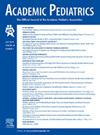Social Needs Screening and Uptake Patterns of a Produce Prescription Program in an Urban Pediatric Primary Care Clinic
IF 2.8
3区 医学
Q1 PEDIATRICS
引用次数: 0
Abstract
Objective
The WE CARE social needs screener (WC screener) is a self-report instrument for 8 social needs. Our objective was to determine whether screening positive for wanting help with food is associated with increased odds of enrollment in Fresh Connect (FC), a produce prescription program.
Methods
Families who completed the WC screener at a well-child visit (n = 1049) and spoke English, Spanish, or Portuguese were called within 2 weeks and offered FC regardless of screener results. Child age, race and ethnicity, caregiver’s preferred language, and insurance were extracted from medical records. A multivariable adjusted logistic regression model was utilized to describe the association between WC responses and likelihood of enrolling in FC.
Results
Overall, 38% of the children were of non-Hispanic White race and ethnicity; 97% of caregivers spoke English, and 52% utilized public insurance. Among caregivers who completed the WC screener, 6% requested help with food. Overall, 20% enrolled in FC. Compared to those who said “no,” saying “yes” to wanting help with food did not increase odds of FC enrollment after adjusting for other variables (adjusted odds ratios [aOR] 0.93, 0.44–1.97), yet saying “maybe later” did (aOR 3.2, 95% confidence interval (CI) 1.2–8.3). Additionally, combining “yes” and “maybe later” also did not have significantly higher odds of enrollment compared to those who said no or left the question blank (aOR 1.46, 95% CI 0.86–2.46).
Conclusions
This pilot study is the first to explore the concordance between screening responses and produce prescription enrollment. Responding “yes” to wanting help with food on the WC screener was not predictive of FC enrollment, which suggests that future primary care-based interventions should evaluate the role of social needs screeners in the referral pathway and consider, when possible, offering food-related assistance to all families regardless of screening responses.
城市儿童初级保健诊所生产处方项目的社会需求筛选和吸收模式。
目的:WE CARE社会需求筛选器(WC筛选器)是一种8种社会需求的自我报告工具。我们的目的是确定在食物方面需要帮助的筛查呈阳性是否与Fresh Connect(一种农产品处方计划)注册的几率增加有关。方法:在儿童访诊时完成WC筛查的家庭(n=1049),说英语、西班牙语或葡萄牙语的家庭在两周内被召集,无论筛查结果如何,都提供FC。从医疗记录中提取了儿童年龄、种族和民族、看护者的首选语言和保险。采用多变量调整logistic回归模型来描述WC反应与入选FC可能性之间的关系。结果:总体而言,38%的儿童是非西班牙裔白人;97%的护理人员会说英语,52%的人使用公共保险。在完成WC筛查的护理人员中,6%的人要求食物帮助。总体而言,20%的人参加了FC课程。与那些说“不”的人相比,在调整了其他变量后,说“是”寻求食物帮助并没有增加FC入组的几率(aOR 0.93, 0.44-1.97),但说“以后可能”会增加FC入组的几率(aOR 3.2, 95% CI 1.2-8.3)。此外,与回答“否”或留空的患者相比,回答“是”和“可能以后再回答”的患者入组的几率也没有显著提高(aOR 1.46, 95% CI 0.86-2.46)。结论:这项初步研究首次探讨了筛查反应与处方登记之间的一致性。对于在WC筛查中寻求食物帮助的回答“是”并不能预测FC的入组,这表明未来基于初级保健的干预措施应该评估社会需求筛查者在转诊途径中的作用,并考虑在可能的情况下,为所有家庭提供与食物相关的援助,而不管筛查反应如何。
本文章由计算机程序翻译,如有差异,请以英文原文为准。
求助全文
约1分钟内获得全文
求助全文
来源期刊

Academic Pediatrics
PEDIATRICS-
CiteScore
4.60
自引率
12.90%
发文量
300
审稿时长
60 days
期刊介绍:
Academic Pediatrics, the official journal of the Academic Pediatric Association, is a peer-reviewed publication whose purpose is to strengthen the research and educational base of academic general pediatrics. The journal provides leadership in pediatric education, research, patient care and advocacy. Content areas include pediatric education, emergency medicine, injury, abuse, behavioral pediatrics, holistic medicine, child health services and health policy,and the environment. The journal provides an active forum for the presentation of pediatric educational research in diverse settings, involving medical students, residents, fellows, and practicing professionals. The journal also emphasizes important research relating to the quality of child health care, health care policy, and the organization of child health services. It also includes systematic reviews of primary care interventions and important methodologic papers to aid research in child health and education.
 求助内容:
求助内容: 应助结果提醒方式:
应助结果提醒方式:


